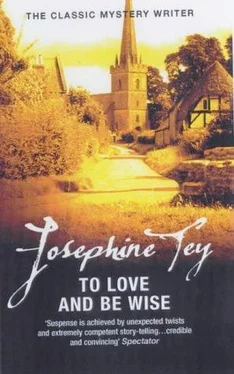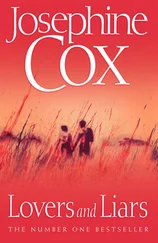Josephine Tey - To Love and Be Wise
Здесь есть возможность читать онлайн «Josephine Tey - To Love and Be Wise» весь текст электронной книги совершенно бесплатно (целиком полную версию без сокращений). В некоторых случаях можно слушать аудио, скачать через торрент в формате fb2 и присутствует краткое содержание. Год выпуска: 1958, Жанр: Классический детектив, на английском языке. Описание произведения, (предисловие) а так же отзывы посетителей доступны на портале библиотеки ЛибКат.
- Название:To Love and Be Wise
- Автор:
- Жанр:
- Год:1958
- ISBN:нет данных
- Рейтинг книги:4 / 5. Голосов: 1
-
Избранное:Добавить в избранное
- Отзывы:
-
Ваша оценка:
- 80
- 1
- 2
- 3
- 4
- 5
To Love and Be Wise: краткое содержание, описание и аннотация
Предлагаем к чтению аннотацию, описание, краткое содержание или предисловие (зависит от того, что написал сам автор книги «To Love and Be Wise»). Если вы не нашли необходимую информацию о книге — напишите в комментариях, мы постараемся отыскать её.
To Love and Be Wise — читать онлайн бесплатно полную книгу (весь текст) целиком
Ниже представлен текст книги, разбитый по страницам. Система сохранения места последней прочитанной страницы, позволяет с удобством читать онлайн бесплатно книгу «To Love and Be Wise», без необходимости каждый раз заново искать на чём Вы остановились. Поставьте закладку, и сможете в любой момент перейти на страницу, на которой закончили чтение.
Интервал:
Закладка:
'No, Williams said, considering it. 'Come to think of it, he's more of a push-ee.
Which put Grant in a good mood for the rest of the journey.
At Wickham they were welcomed by the local inspector, Rodgers; a thin, anxious individual who looked as though he slept badly. He was alert, however, and informative and full of forethought. He had even booked two rooms at the Swan in Salcott and two at the White Hart in Wickham, so that Grant could have his choice. He bore them off to lunch at the White Hart, where Grant confirmed the room-booking and caused the Salcott booking to be cancelled. There was to be no suggestion yet that Scotland Yard were interested in the matter of Leslie Searle's disappearance; and it was not possible to conduct inquiries from the Swan without creating a sensation in Salcott.
'I'd like to see Whitmore, though, Grant said. 'I suppose he is back at-what do you call it: Miss Fitch's place.
'Trimmings. But he's up in town today giving his broadcast.
'In London? said Grant, a little surprised.
'It was arranged like that before they set out on this trip. Mr Whitmore's contract calls for a month off in August, when broadcasting has its «off» season; so there was no question, it seems, of passing up this week's broadcast just because he was canoeing on the Rushmere. They had arranged to be in Wickham today and to spend the night there. They had booked two rooms at the Angel. It's the olde-worlde show-place in Wickham. Very photogenic. Then this happened. But since there was nothing Mr Whitmore could do here, he went up to do his half-hour, just as he would have if they had reached Wickham.
'I see. And he is coming back tonight?
'If he doesn't vanish into thin air.
'About this vanishing: did Whitmore agree that there had been disagreement between them?
'I didn't put it to him. That's what — The Inspector broke off.
'That's what I'm here for, Grant said, finishing the sentence for him.
'That's about it, sir.
'Where did the «disagreement» story come from?
'The Swan. Everyone who was there on Wednesday night had the impression that there was some kind of tension between them.
'No overt quarrel?
'No, nothing like that. If there had been anything like that I could have taxed him with it. All that happened was that Mr Whitmore left early without saying goodnight, and Searle said he was angry about something.
' Searle said! To whom?
'To the local garage-keeper. A chap called Maddox. Bill Maddox.
'Have you talked to Maddox?
'I talked to them all. I was in the Swan last night. We spent the day dragging the river in case he had fallen in, and making inquiries all round the neighbourhood in case he had lost his memory and was just wandering. We couldn't find any body, and no one had seen him or anyone answering his description. So I finished up at the Swan, and saw most of the people who had been there on Wednesday night. It's the only pub in the place, and a very nice respectable little house run by a Joey; an ex-sergeant of Marines; and it's the meeting-place for the whole village. None of them was exactly anxious to involve Mr Whitmore —
'Popular, is he?
'Well, popular enough. He probably shines by comparison. There's a very odd crew lives here, I don't know if you know.
'Yes, I've heard.
'So they didn't want to get Walter Whitmore into trouble, but they had to explain why the two friends didn't go back to their camp together. And once they broke down and talked they were unanimous that there was some sort of trouble between them.
'Did this Maddox volunteer his story?
'No, the local butcher did. Maddox had told them about it on the way home on Wednesday. After they had seen Searle go away by himself down the lane. Maddox confirmed it, though.
'Well, I'll go and see Whitmore when he comes back tonight, and ask for his story. Meanwhile we'll go and see the place where they camped on Wednesday night.
9
'I don't want to appear in Salcott just yet, Grant said as they drove out of Wickham. 'Is there some other way to the river bank?
'There's no way at all to the river bank, properly speaking. There's about a mile of field-path from Salcott to where they were. But we could reach the place just as easily from the main Wickham-Crome road, across the fields. Or we could turn off the road by a lane that goes to Pett's Hatch, and walk down the river bank from there. They were moored about a quarter mile below Pett's Hatch.
'On the whole, I'd rather walk across the fields from the main road. It would be interesting to see how much of a walk it is. What kind of a village is Pett's Hatch?
'It isn't a village at all. Just a ruined mill and the few cottages that used to house the workers there. That is why Whitmore and Searle walked into Salcott for their evening drink.
'I see.
The ever-efficient Rodgers pulled a one-inch Survey map out of the pocket of his car, and studied it. The field opposite which they had stopped looked to Grant's urban eye exactly like any other field that they had passed since leaving Wickham, but the Inspector said: 'It should be about opposite here, I think. Yes; there's where they were; and here is us.
He showed the lay-out to Grant. North and south ran the road from Wickham south to Crome. West of it lay the Rushmere, out of sight in its valley, running north-east to meet the road at Wickham. At a point level with where they were now halted, the river ran back on itself in a wide loop over the flat bed of the valley. At the point where it first curved back, Whitmore and Searle had made their camp. On the farther side of the valley, where the river came back level with them, was Salcott St Mary. Both their camp and the village of Salcott were on the right bank of the river, so that only a short mile of alluvial land lay between their camp and the village.
As the three men reached the third field from the road, the countryside opened below them, so that the relevant section of the Rushmere valley was laid out for them as it had been on Rodgers's map: the flat green floor with the darker green scarf of the Rushmere looped across it, the huddle of roofs and gardens on the far side where Salcott St Mary stood in its trees; the lonely cluster, back up the river to the south, that was Pett's Hatch.
'Where is the railway from here? Grant asked.
'There is no railway nearer than Wickham. No station, that is. The line runs the other side of the Wickham-Crome road; not in the valley at all.
'Plenty of buses on the Wickham-Crome road?
'Oh, yes. But you're not suggesting that the fellow just ducked, are you?
'I'm keeping the possibility in mind. After all, we know nothing about him. I'll admit there are more likely possibilities.
Rodgers led them down the long slope to the river bank. Where the river turned away south-west two large trees broke the line of pollarded willows: a tall willow and an ash. Under the ash were moored two canoes. The grass still had a trampled look.
'This is the place, Rodgers said. 'Mr Whitmore spread his sleeping-bag under that big willow, and Searle put his round the other side of the ash where there is a hollow between the roots that makes a natural shelter. So that it was quite natural that Mr Whitmore should not know that he wasn't there.
Grant moved over to where Searle's bed had been, and considered the water.
'How much current is there? If he had tripped over those roots in the dark and taken a header into the river, what would happen?
'It's a horrid stream, the Rushmere, I admit. All pot-holes and under-tows. And a bottom of what the Chief Constable calls "immemorial mud". But Searle could swim. Or so Walter Whitmore says.
'Was he sober?
'Cold, stone sober.
'Then if he went into the water unconscious, where would you expect to find his body?
Читать дальшеИнтервал:
Закладка:
Похожие книги на «To Love and Be Wise»
Представляем Вашему вниманию похожие книги на «To Love and Be Wise» списком для выбора. Мы отобрали схожую по названию и смыслу литературу в надежде предоставить читателям больше вариантов отыскать новые, интересные, ещё непрочитанные произведения.
Обсуждение, отзывы о книге «To Love and Be Wise» и просто собственные мнения читателей. Оставьте ваши комментарии, напишите, что Вы думаете о произведении, его смысле или главных героях. Укажите что конкретно понравилось, а что нет, и почему Вы так считаете.












